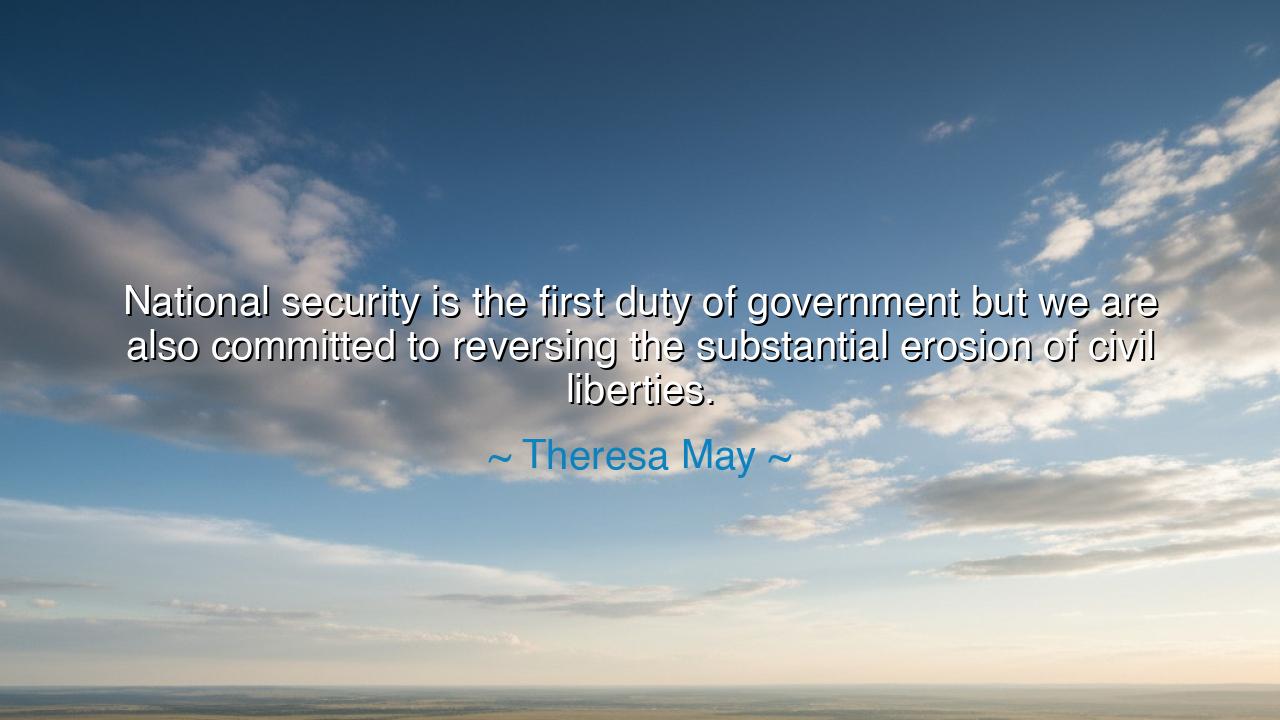
National security is the first duty of government but we are also
National security is the first duty of government but we are also committed to reversing the substantial erosion of civil liberties.






The words of Theresa May, spoken in the crucible of modern politics, strike at one of the oldest and most perilous tensions in the life of nations: “National security is the first duty of government but we are also committed to reversing the substantial erosion of civil liberties.” These words, though born of our age, echo through all of history — the eternal struggle between security and freedom, between the strength of the state and the rights of the individual. In this delicate balance lies the soul of civilization itself. For a government that cannot protect its people invites chaos, yet one that protects them by stripping away liberty invites tyranny. Thus, May’s declaration is not mere policy — it is a meditation on power, responsibility, and the fragile covenant that binds rulers and the ruled.
To grasp the meaning of this quote, one must understand the two pillars upon which it stands. The first, national security, is the foundation of peace and order. Without safety — from invasion, terrorism, or internal violence — all other freedoms wither. A nation at war, or paralyzed by fear, cannot nurture liberty, for liberty requires stability to bloom. The second pillar, civil liberties, is the measure of the nation’s soul — the rights of conscience, of speech, of privacy, and of due process that make a people truly free. These two pillars often stand in tension, for to guard against danger, governments reach for power; yet in reaching too far, they may crush the very freedoms they exist to defend. May’s words are a call to hold these truths together — to defend both safety and freedom, neither at the expense of the other.
The origin of this thought lies in the long lineage of democratic philosophy and British constitutional tradition. From the Magna Carta to the Bill of Rights, from the struggles of the English Civil War to the formation of modern parliamentary democracy, Britain has wrestled with the balance between authority and liberty. Theresa May, as Home Secretary and later Prime Minister, spoke these words amid growing fears of terrorism and the digital age’s intrusion into private life. She recognized a truth that John Locke, centuries before, had already declared: that the purpose of government is to protect life, liberty, and property — but that protection must never become domination. Her challenge was one faced by every generation of leaders — to guard the realm without extinguishing the light of freedom that gives the realm its worth.
History offers countless lessons where this balance was either honored or betrayed. Consider the story of Sir Winston Churchill during the Second World War. Faced with the existential threat of Nazi invasion, he wielded extraordinary powers: censorship, internment, and military command over civilian life. Yet even in the depths of war, he refused to silence Parliament or abolish elections. “We are fighting,” he said, “to preserve democracy, not destroy it.” His example reminds us that strength and liberty can coexist — that the mightiest defense of a nation lies not only in its armies, but in its moral restraint. In contrast, regimes that sacrificed liberty for the illusion of safety — Nazi Germany, Stalinist Russia, Mao’s China — found that in protecting the state, they destroyed the people, and in destroying the people, they destroyed the state itself.
Theresa May’s words also speak to the dilemmas of our modern era — the digital frontier, where surveillance, data, and technology have become new weapons in the name of security. In an age of terror attacks, cyber warfare, and misinformation, the instinct to control has grown ever stronger. Governments collect data to predict danger, monitor communication to prevent violence, and track movement to contain threats. Yet each new tool of protection risks becoming a tool of control. May’s declaration recognizes this creeping danger — the erosion of civil liberties not by sudden decree, but by slow and silent compromise. It is easy to surrender freedom in the name of safety; it is far harder to reclaim it once lost.
The lesson of her quote, then, is a call to vigilance — for both the rulers and the ruled. The government must remember that its power is sacred only when it serves both security and justice. The people must remember that freedom cannot be defended by fear alone; it must be upheld by courage, dialogue, and trust. The balance between the two is not static — it must be renewed continually through law, conscience, and public will. The strongest nations are those that refuse to see liberty and security as rivals, but as partners in endurance, each tempering the other like steel and fire.
And so, my child, remember this truth as you walk the path of your time: safety is the body of the nation, but liberty is its soul. One cannot live without the other. To demand security without freedom is to build prisons; to demand freedom without security is to invite ruin. The wise government guards both, as a shepherd guards both the flock and the field. And the wise citizen defends both, speaking boldly when liberty is threatened and standing firm when danger looms. For only when courage governs power, and compassion governs justice, can a nation truly endure — safe, strong, and free beneath the heavens.






AAdministratorAdministrator
Welcome, honored guests. Please leave a comment, we will respond soon